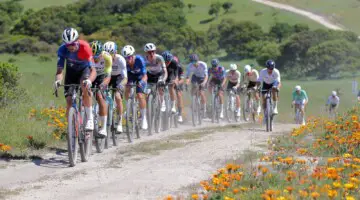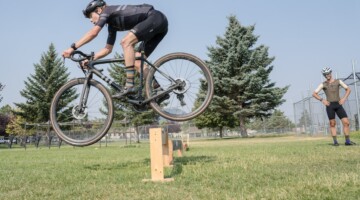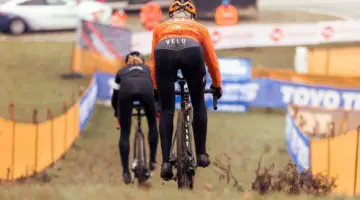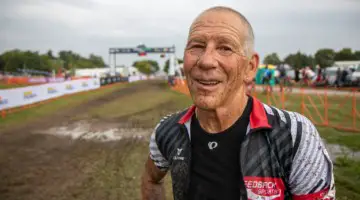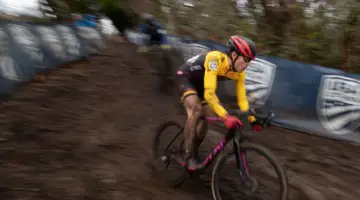“How come I never….” “I never beat….” “I always struggle with….”
There’s plenty of self-doubt in many bike racers. You hear it on the start line all the time. Self-deprecating riders that often times aren’t making excuses as much as they are setting themselves up for failure. Then there are a few racers that seem jovial, almost gleeful, at the thought of what may happen. And often, those riders race well.
Positive mental outlook. Some people have it naturally. But others of us have to work on it. But how?
Chris Mayhew with JBV Coaching walks us through the thought process of thinking positive for positive results.
by Chris Mayhew
After a race last season I tweeted that it was the first race I’d ever completed with all positive self-talk. One of the most successful American bike racers tweeted back, asking how I’d done that, the implication being it was also something that top professionals struggle with. So it’s not just you and me that struggle with staying afloat during races, staying positive and present and not beating yourself up before, during or after. How do you reach that positive state? The same way you get good at anything: you practice. A lot.
Let’s talk about how to use training intervals as a time to practice positive mental habits while also gaining fitness.
The first thing you can do is set realistic goals. Figure out a reasonable goal for your intervals, say 250 watts for some duration or reaching a particular landmark on a hillclimb. To determine a realistic goal look at what you did previously for a given workout. Don’t expect a dramatic increase from week to week. After a certain age just getting back to where you’ve been in the past can be a realistic goal.

Whatever the goal, make sure it’s realistic given your past accomplishments. File photo: Gordon sits with his champion’s jersey on and a medal around his neck after taking the win in Asheville. © Cyclocross Magazine
With racing, look at past results, which crossresults.com makes incredibly easy. Look at their race predictor as well and consider that a benchmark. If you haven’t raced enough to seed crossresults, just take what comes and be happy. And then allow yourself to be happy when you achieve that goal.
One big issue you see with expectations is that they creep. Monday starts with “I’d be stoked with 250 watts or 20th place.” By Wednesday it’s “man I would love to do 265 watts or land 15th.” Then the interval or event rolls around on Saturday and you did 250 to 255 watts or got 18th place and think “man, I should have done so much better.” Set a goal, make sure that goal is grounded in data, and allow yourself to celebrate when you reach it. “Sweet, 250 watts, bang! Maybe next week I’ll see if I can bring it up to 255 watts or play that finale a little smarter.”
The next thing is what’s referred to as the 5Ps. Prior Planning Prevents Poor Performance. If you got stuck at work late and had to dash out the door without eating to get in intervals before dark, things are probably not going to go well, right? But if you take some time to pack some food and make sure you have the right clothing, that’s about the best you can hope for. Focus on the little things that you can control. That your bike is in good working order, that you’re properly fueling your intervals, before, during and after.
Let that focus on process and details carry over to your bike racing as well. Pack well, plan ahead, know the venue as best you can. It’s called having trust in the process. If you’ve done what you reasonably can to prepare for what you’re about to undertake, that should give you a lot of confidence when it comes time to execute for your intervals or race. Have faith in everything you’ve done up till that point. And the things you can’t control? Don’t worry about them. If you can’t do anything about it, why think about them?
Then stay present while you do the thing. The worst crash I’ve ever had in ‘cross was while fighting with my wife in my head. Mentally I was anywhere but the race and I ate it pretty hard, on pavement no less. That’s an extreme example, but be mindful while you’re doing your intervals. Don’t stare at your powermeter or have both earphones in and the music cranked. Pay attention to your breathing, what the effort feels like in your legs. Take stock periodically of how you feel, and how much you think you have left in the tank. Don’t try and distance yourself from the sensations of going hard, but instead become familiar with them. Visualize yourself in a race situation, experiencing these same sensations and being successful.
Deep in the paincave with no flashlight is a great time to also practice positive self-talk. As a coach I feel there should be an element of doubt when you do intervals. They should be uncomfortable enough that you’re quite not sure you can do what you’re attempting. So when thoughts like “I can’t do this” creep in, acknowledge them and then gently push them aside. Tell yourself of course you can, you did this last week. Or yes you can, there’s only a couple of more minutes left in this interval.
Similarly, when racing, acknowledge the “I suck” thoughts and push them aside too. Maybe you’re a few spots back, but tell yourself to just focus on the effort and on executing each obstacle or transition to the best of your ability. Or maybe you’re in a panic on the first lap and remind yourself you still have many minutes left of bike racing. Maybe you really are having a bad day. Switch your focus from “I suck” to focusing on carving some sweet lines or being the only one to ride a particular section. Use a bad day to gain perspective, or to develop other aspects of your skillset. Don’t focus on what’s going wrong and don’t tie your self worth to your perception of how things are currently going.
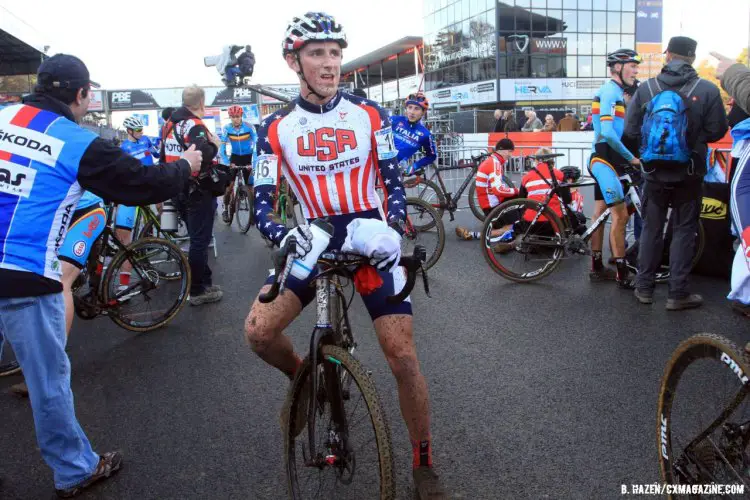
After a race or workout, it’s good to take a few minutes to reflect on what went right. File photo of Gage Hecht post race at Zolder. © Bart Hazen
Take a few moments immediately afterwards and decompress. I always phrase it as “what do you want to keep for next time and what do you want to change?” Hopefully you’ve got a few minutes to ride between home and your intervals. Think about what went right and what didn’t. You don’t have to make any hard and fast decisions about what to do, just think about what did happen. “I was sagging in the second half there” or something like that. But give yourself a moment to think about it. For a race, go get your clothes and recovery drink and cool down for 15 to 20 minutes. It’s a good idea for a lot of reasons but decompressing and letting your hormone levels return to normal is one of them. Think about how your result compares to what you wanted, about what went right and what you’re going to use as inspiration to train a little harder in the coming weeks.
The military calls this process “train like you fight.”
You spend hours upon hours on your bike, doing intervals, working on bike handling and ‘cross specific techniques. But while you’re doing that, also try and focus on the mental habits you want to form so that when you’re racing and in the heat of the moment you’re not trying to do something you haven’t done 100 times before. Each time, you can fall back on positive mental habits avoiding negative self-talk or doubting because you’ve done as much mental training as you have physical to prepare for racing.
If nothing else hopefully it will make your racing more fun and enjoyable. Maybe it makes you more pleasant to be around before and after races. But I’d be willing to be in the long term it will also make you faster.

